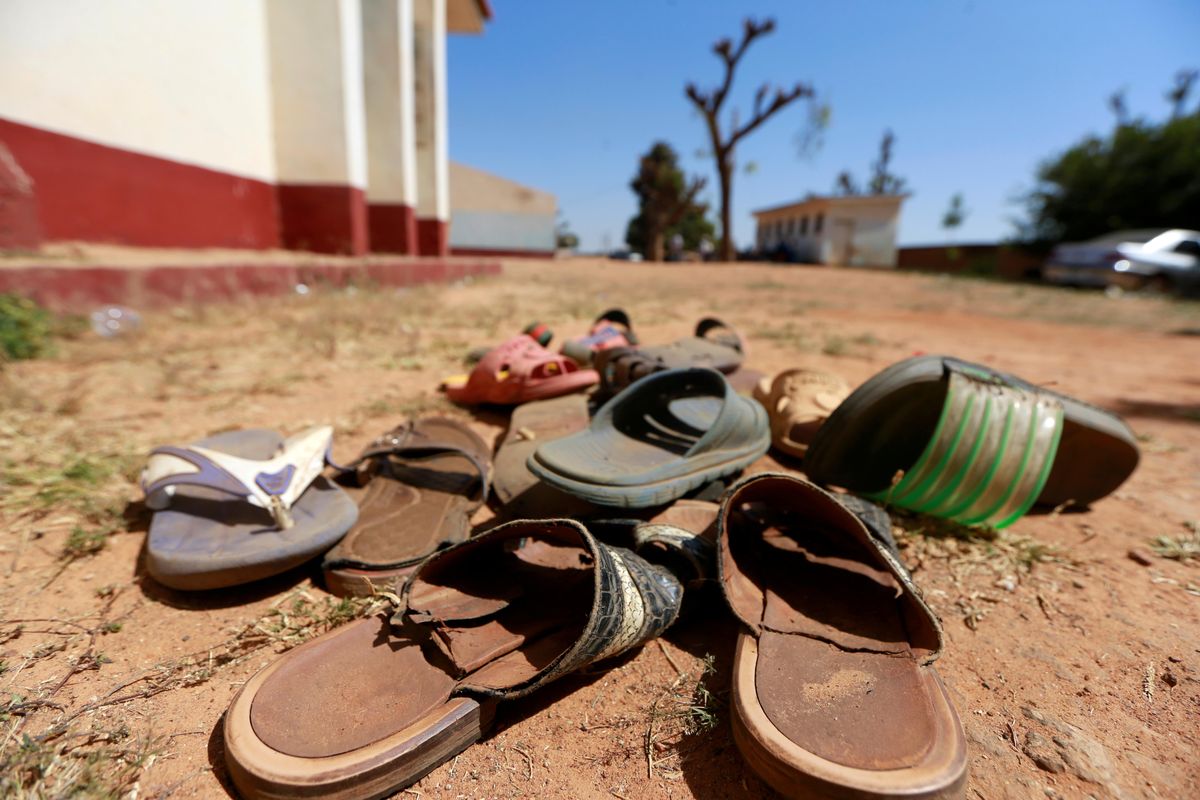The reports are horrifying. Bullets flying overhead as school-age kids scream out in fear. Chaos. Shrapnel. Hundreds go missing.
This was the scene last week when militants stormed a high-school in Katsina, northern Nigeria, to abduct hundreds of students, 400 of whom remain missing. It's a horror story reminiscent of the 2014 kidnapping of schoolgirls that prompted the viral #BringBackOurGirls campaign championed by former US first lady Michelle Obama.
The attack, which has now been claimed by the militant group Boko Haram, comes just weeks after the brutal slaying of Nigerian farmers in Borno state by militants on motorcycles. (At least thirty of the victims were beheaded.)
Nigerians have grown increasingly furious at the government for not doing more to keep them safe. But what are the conditions that have allowed groups like Boko Haram and Islamic State cells to gain a foothold in Africa's most populous country and largest economy?
A new era. When Nigeria held presidential elections in 2015, it was the first time the country of over 200 million people had experienced a peaceful transition of power. Muhammadu Buhari — a former general who led a military junta that ruled Nigeria in the early 1980s — was elected as a civilian, vowing to root out government corruption and extrajudicial killings, and prioritize Nigeria's democratic awakening.
Buhari also pledged to combat Boko Haram, which was founded in 2002 aiming to establish Nigeria as an Islamic state, and had successfully seized swaths of territory under former president Goodluck Jonathan.
But Buhari's promises proved to be mostly empty. For instance, the government's brutal Special Anti-Robbery Squad (long accused of torture and extrajudicial killings) that Buhari had pledged to overhaul, continued to terrorize Nigerians, giving rise to mass protests this past fall.
Meanwhile, poverty has surged while corruption and grifting from those at the top have continued unabated. Unemployment among young Nigerians now hovers around 30 percent, a telling sign in a country where more than half of the population — over 100 million people — is under the age of 30.
Economic woes. After promising to deliver annual economic growth of 10 percent, Buhari has also squandered Nigeria's economic opportunities over the past five years. In failing to diversify the country's economy, his government has left Nigeria, Africa's largest oil producer, vulnerable to the shocks of global oil markets.
Indeed, armed groups' attacks on oil facilities have further undermined the petroleum-rich nation's oil output. And disruptions to oil and gas supply chains have only gotten worse in the COVID era.
Nigeria's internal strife is further complicated by deep-rooted divisions along ethnic and religious lines. Around half the country's population identifies as Christian, while the other 50 percent, mostly in the country's northern provinces, identify as Muslims. While groups like Boko Haram subscribe to a warped interpretation of Islam that justifies murder of Christians, in practice, both Christians and Muslims have been targeted in recent years.
To be sure, religious and ethnic divisions don't explain everything about Nigeria's internal struggles. Clashes between herders and farming communities, which have erupted across Nigeria's Middle Belt in recent years, are mostly between Muslim ethnic groups, leading to hundreds of deaths and the displacement of thousands. Still, a 2019 survey found that while 73 percent of Nigerian Muslims approve of President Buhari, who is Muslim, only 26 percent of the country's Christians feel the same way.
Spillover effects: While Boko Haram's activities have mostly been concentrated in northeastern Nigeria, the group has at times expanded its reach throughout the central states, targeting hubs like Abuja, the capital.
Meanwhile, because of porous state borders within sub-Saharan Africa, insurgent violence in Nigeria has spilled over into neighboring countries too, stoking up local tensions in places like Chad, Cameroon, and Niger that lack the institutional strength to counter violent insurgencies.
No end in sight. While the Nigerian military — with assistance from neighboring countries — had some success in 2015 in pushing out Boko Haram from areas in the country's northeast, the problem persists: the militant group still retains control over some territory that it uses as a launching pad for waging deadly attacks that Buhari's government appears unable to control.






